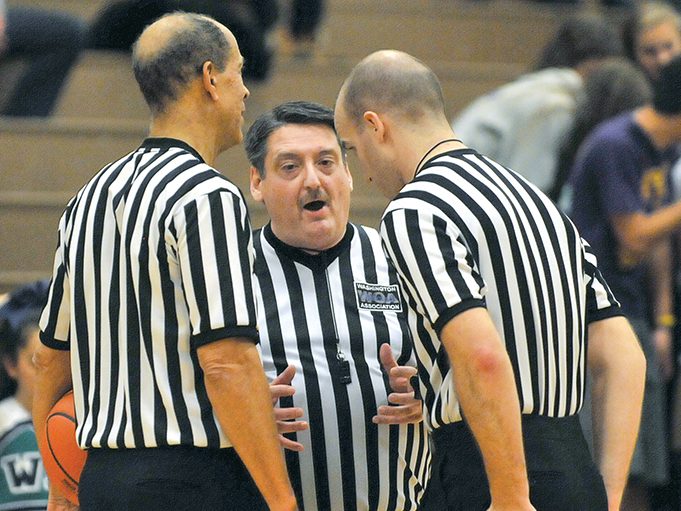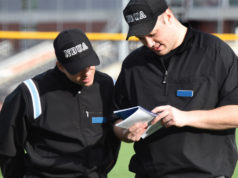Most people think two teams are required for an athletic competition. Officials know better. It takes three: the two teams scheduled to take the field or court, plus the team of officials. Anything else is just practice.
Just as the athletes must work as a team in order to win, the officiating crew must exhibit teamwork in order to execute at the highest level. But being assigned to a crew does not teamwork make. So how well do crews perform? Grade your team on these aspects and see how you fare.
Is everyone on the crew there for the same reason?
Common mission and values drive team success. The pressure to “move up” or “win” postseason assignments is a powerful one. The desire to make more money doing other sports can be a draw as well. Is there enough focus by individual crewmembers on the game at hand?
Does the crew take personal responsibility for game preparation?
Is the crew ready? Many associations require weekly case reviews and regular study. But even when they don’t, it’s the individual’s responsibility to maintain a solid understanding of the fouls, penalties, rules of the game and specifics of your position. Does the crew arrive at the pregame prepared? Do the crewmembers hold each other accountable?
What is the nature of the pregame meeting?
Business or bickering? Are the pregame meetings coordinated and geared toward discussing points of emphasis and potential game events? Does the atmosphere encourage questions and learning? Or are the sessions mired in complaints about game fees and other officials?
How does the crew view the lead official?
The head of the crew wields significant influence not only on the field or court, but off. During a game, does he or she create an environment of, “Let’s just get the call right,” or one of, “Don’t embarrass me”? Are crewmembers more concerned with the lead official’s influence on subsequent playoff assignments?
How is conflict handled?
Officials are notoriously confident — they have to be in order to make split-second decisions. In pressure filled situations, that confidence can manifest itself in the form of closed minds and an unwillingness to discuss other viewpoints. Is your crew able to handle conflict constructively and quickly among crewmembers?
Do we focus only on the negative?
Clearly, bad calls draw the most attention and they need to be addressed at the appropriate time. However, positive feedback validates good performance and builds a constructive and upbeat atmosphere.
Are crewmembers empowered?
Empowerment is a word often overused and seldom understood. Empowered team members enjoy an environment of trust that fuels assured decision-making. They are vested in the success of the crew.
Are the roles of each crewmember clear?
That is usually a case of mechanics but it’s one worth revisiting on a regular basis. Who’s watching the ball? Who has the action around the play? Those processes often change as crews grow.
Does the crew communicate?
Every sport requires communication among crewmembers. That isn’t limited to the pregame meeting. Rather, sound in-game mechanics allow effective communication among crewmembers before and after the play.
Does the crew follow through?
Teamwork among officiating crews needs not end when the final whistle sounds or the final out is called. Effective teams use postgame discussions to reinforce positive aspects of their performance and identify areas that need attention.
The officiating crew may not be the team the crowd pays to see, but the need to function as a team is just as important. Use the above questions as a guideline to see where your crew stands.
What's Your Call? Leave a Comment:
Note: This article is archival in nature. Rules, interpretations, mechanics, philosophies and other information may or may not be correct for the current year.
This article is the copyright of ©Referee Enterprises, Inc., and may not be republished in whole or in part online, in print or in any capacity without expressed written permission from Referee. The article is made available for educational use by individuals.


















